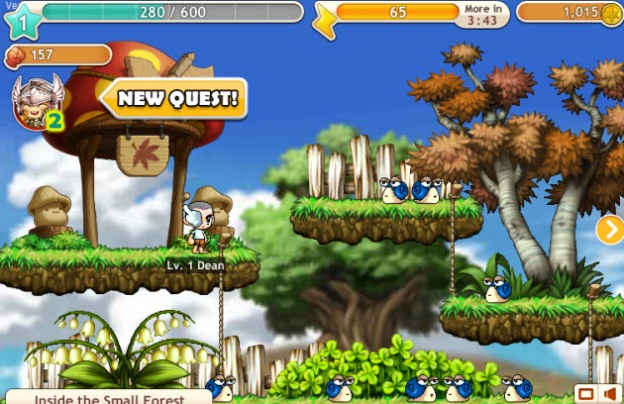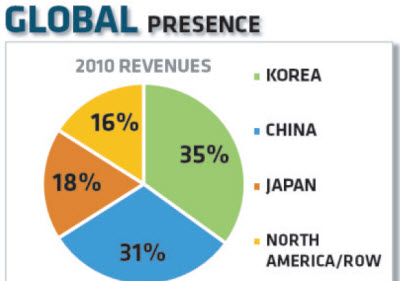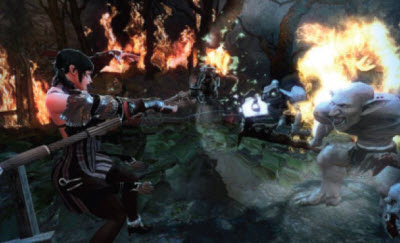 Online gaming firm Nexon is expected to go public on Dec. 6 in Japan, VentureBeat has learned. The company, which was started in Korea and moved its headquarters to Tokyo, is expected to raise $1.28 billion in its initial public offering. [Update: the price was set on Dec. 6. The IPO will be Dec.14]
Online gaming firm Nexon is expected to go public on Dec. 6 in Japan, VentureBeat has learned. The company, which was started in Korea and moved its headquarters to Tokyo, is expected to raise $1.28 billion in its initial public offering. [Update: the price was set on Dec. 6. The IPO will be Dec.14]
 Next to Zynga’s expected IPO, the Nexon deal is one of the biggest pending IPOs in the video game industry and it’s an example of the continuing strength of Asian online game companies. Nexon in particular has pioneered the top business model of the day: free-to-play games where people play games for free and pay real money for virtual goods. It’s a growing business: Market researcher Strategy Analytics expects the virtual goods market to grow from $6.8 billion in 2011 to $12.7 billion in 2016.
Next to Zynga’s expected IPO, the Nexon deal is one of the biggest pending IPOs in the video game industry and it’s an example of the continuing strength of Asian online game companies. Nexon in particular has pioneered the top business model of the day: free-to-play games where people play games for free and pay real money for virtual goods. It’s a growing business: Market researcher Strategy Analytics expects the virtual goods market to grow from $6.8 billion in 2011 to $12.7 billion in 2016.
Nexon has not commented on the IPO date. Earlier reports placed the IPO in mid-December.
Last month, Japanese publications reported that the Nexon IPO could raise that amount in an offering on the Tokyo Stock Exchange. The prospectus for the offering says that Nexon has 1.2 billion cumulative registrations, 77 million monthly active users as of September, 600 million virtual items sold in 2010, and 500 billion minutes played in 2010.
Nexon is one of Asia’s biggest online game publishers, with games including MapleStory, Mabinogi, Vindictus, Combat Arms, Dragon Nest and Dungeon Fighter Online. The games take anywhere from two years to five years to develop. To juice sales of the games, Nexon sells its virtual currency game cards in 45,000 stores in the U.s. alone.
The IPO would be the biggest IPO in Japan in 2011 and the largest one since Otsuka Holdings raised $2.05 billion in December, 2010.
 Nomura Securities, Morgan Stanley, and Goldman Sachs are lead investment managers. After the IPO, Nexon could have a market value of about $7.69 billion to $8.97 billion. That compares to $6.99 billion for Electronic Arts.
Nomura Securities, Morgan Stanley, and Goldman Sachs are lead investment managers. After the IPO, Nexon could have a market value of about $7.69 billion to $8.97 billion. That compares to $6.99 billion for Electronic Arts.
In its IPO filing, Nexon said it has eight games with more than $100 million in lifetime revenues. Of those games, three had more than $300 million in revenues and one had more than $400 million in revenues. Two games combined have generated lifetime revenues over $1.5 billion. Nexon noted that as of last year, Dungeon Fighter accounted for 30.9 percent of revenues and MapleStory was 26.3 percent of revenues.
In 2010, Nexon’s revenues were $903 million, up from $668.2 million a year earlier. Net income was $107.5 million in 2010, compared to $229.2 million a year earlier. For the nine months ended Sept. 30, 2011, revenue was $853.5 million, up 26.5 percent from a year ago. Net income was $260.1 million, up 14.6 percent. Overall, Nexon expects to continue growing for the full year in 2011. Nexon has been profitable since 1996.
Much of the revenue is spread across multiple territories. For instance, only 35.2 percent of revenues for the Mabinogi game comes from Korea. In the U.S., virtual goods typically sell for 50 cents to $5. In MapleStory, there are 2,000 virtual goods items for sale in the U.S. version, all designed for a Western audience. They include things like a “summer royal hair” hairstyle.
Nexon has 3,537 employees, including 1,507 employees in development. Rivals include NCsoft, NHN Games, Hanbit Soft, Neowiz Games, Square Enix, DeNA, Gree, Nintendo, Sony, Tencent, Shanda Games, Electronic Arts, Activision Blizzard, Riot Games, Zynga, Disney and Microsoft.
More recently, Nexon has been expanding in the U.S., launching a Facebook version of MapleStory and investing in mobile social games. It also invested in social game maker 6waves Lolapps. The company’s overall strategy is to take its games to new platforms and devices, build a global brand, expand its game portfolio, and extend its existing game franchises.
Nexon is planning to issue 70 million shares of common stock on a global basis, including 34.9 million shares to be issued outside of the U.S. and Japan. In Japan, the company will issue 35.05 million shares. After shares are issued, Nexon will have 430.6 million shares of common stock. After the offering, NXC will own 59 percent of Nexon’s shares. NXC is controlled by Nexon founder Jungju Kim.
Among the risk factors, Nexon cited hacker attacks. It said that in April 2011, a server in North America was hacked and that may have led to access to encrypted data on 24 million accounts. Nexon found that virtual currency had been tampered with and it suspended the accounts of users who saw abnormal increases in virtual currency. In August, 2011, another hacker attack in Korea may have provided hackers access to 4.5 million unencrypted cell phone numbers, including 130,000 with other personal information. Nexon said it was also aware of 200 illegal servers that were hosting its games for free.
As of Sept. 30, Nexon had $577.7 million in cash. Nexon was founded in 1994. It began a global expansion in 2005. Over the years, it acquired Wizet, Neople, Ndoors, and GameHi. Revenues from mobile games were not material in 2011.
Now it has 57 online games played in 104 countries. Some 32 of the games are role-playing games, six are first-person shooters, and 19 are in other categories such as social games. Nexon’s KartRider game has more than 270 million registered users.
Among the investors is Min Seo, Sangbeon Kim, Seungchan Lee, Softbank Ventures Korea, NE Partners and Insight Venture Partners. Nexon said that it invested in JC Entertainment on Oct. 24, giving it a 16.3 percent share in the company.
VentureBeat's mission is to be a digital town square for technical decision-makers to gain knowledge about transformative enterprise technology and transact. Learn More
